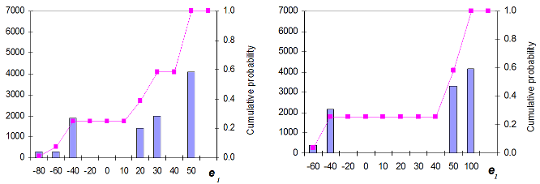Stochastic optimization and robust solutions
Optimal design and implementation of proper policy instruments against growing risks from natural hazards is becoming even more important in a view of more severe climate change and increasing interdependencies among socioeconomic and environmental sectors and countries.
Due to essential non-stationarity and inherent uncertainties, the mission of systems analysis in addressing these issues is shifting from prediction to design optimal solutions which are robust from the economic, social, environmental perspectives with respect to all potential uncertainties. Under collective catastrophic risks, the use of average aggregate values, mean-variance analysis, least square estimates may be misleading. ASA has been developing quantile-based stochastic optimization methods to produce robust solutions.
Among recent achievements is the development of new stochastic optimization methods and models with nested objectives based on compound functions to solve multi-stage models involving long-term strategic and short-term operational (adaptive) decisions of various agents of multi-criteria character, involving multiple sub-models [1]. The approach was successfully applied in several case studies.
There was also a focus on optimal (in the sense of social welfare) planning of dams under catastrophic risks [2]. Endogeneity of risks on land use decisions represents new challenges for dam development planning. An integrated risk management model allows robust decisions to be built, with robust being defined as safe, flexible, and optimal in accounting for multiple criteria, risks, and heterogeneities of locations and stakeholders. Special attention was paid to the choice of proper discount factor to address long-term planning perspectives of dam construction and maintenance. It was shown how misperception of proper discounting in the presence of potential catastrophic events may overlook the need for dam maintenance and undermine regional safety.
In catastrophe management, risk spreading is one of the important measures for increasing societal resilience to disasters. Three studies developed an integrated catastrophe management modeling framework which explored several alternative risk spreading options and applied them to three case-studies with proper model customization to the regions in question: Tuscany region (Italy), the Upper Tisza river region (Hungary), and the Rotterdam area (Netherlands) [3][4][5]. The modeling framework included a loss-spreading program involving partial compensation to victims by the central government and public-private insurance scheme with a pool of insurers on the basis of location-specific exposures. One analysis revealed that the insurance premium scheme defined by the applied model is more robust to various flood scenarios compared with that traditionally defined by mean annual loss (Figure 1) [6]. These results can be are used to guide policy with respect to location-specific risk exposures so as to avoid over-payment (in the long run) of premiums by the insured and insolvency (bankruptcy) on the part of insurers.

Figure 1. Flood risks case study – systemic financial demand-supply gaps: Negative numbers on horizontal axis define financial gap (bankruptcies) of insurance company when premiums do not cover claims, and vertical axis indicates the number of times the gap occurs. Robust premiums (b) reduce the frequency and the severity of the gap, compared to actuarial premiums (a), at the same time reducing the demand for other flood-risk related contingent instruments, i.e., contingent credit, cat bond. Source: Ermoliev et al. [4].
Another challenge for sustainable regional economic development is food and water security. Mathematically, it can also be addressed by means of stochastic optimization approaches. Four studies [6] [7] [8] [9] applied stochastic optimization within the GLOBIOM modeling framework developed at IIASA, in which external weather shocks to crops generate risks not only to food but also to biofuel energy security. Optimal combinations of crops, given these risks, are defined.
The main results of the ongoing project “Integrated management of food, energy, and water security for sustainable social, economic and environmental developments” (2012-2016), supported by the National Academy of Science of Ukraine (NASU), on development of models and methods for the integrated analysis of coordinated robust decisions on food-water-energy security were published [10]: analysis of regional variations of water balances and ecosystems productivity; technological aspects of energy security; poverty analysis in Ukraine – causes, drivers, and impacts; and analysis of sustainable development indicators in global and regional contexts.
References
[1] Ermoliev Y, Norkin V (2013). Sample average approximation method for compound stochastic optimization problems. SIAM Journal on Optimization, 23 (4), 2231—2263.
[2] Ermolieva T, Ermoliev Y, Obersteiner M, Makowski M, Fischer G (2013). Dams and catastrophe risk: Discounting in long term planning. In: A. Amendola, T. Ermolieva, J. Linnerooth-Bayer, R. Mechler (Eds.). Integrated Catastrophe Risk Modeling: Supporting Policy Processes, Springer, Dordrecht, Netherlands, 73—92.
[3] Ermolieva T, Ermoliev Y (2013). Modeling catastrophe risk for designing insurance systems. In: A. Amendola, T. Ermolieva, J. Linnerooth-Bayer, R. Mechler (Eds.). Integrated Catastrophe Risk Modeling: Supporting Policy Processes, Springer, Dordrecht, Netherlands, 29—52.
[4] Ermoliev Y, Ermolieva T, Galambos I (2013). Optimizing public private risk transfer systems for flood risk management in the Upper Tisza Region. In: A. Amendola, T. Ermolieva, J. Linnerooth-Bayer, R. Mechler (Eds.). Integrated Catastrophe Risk Modeling: Supporting Policy Processes, Springer, Dordrecht, Netherlands, 245—262.
[5] Ermolieva T, Filatova T, de Bruijn K, Jeuken A, Obersteiner M, Ermoliev Y (2013). Integrated Catastrophic Flood Model for Designing Robust Flood Insurance Program. Case Study in Rijnmond-Drechtsteden Area, The Netherlands. IIASA Interim Report IR-13-002.
[6] Fuss S, Havlík P, Szolgayová J, Ermoliev Y, Ermolieva T, Khabarov N, Kraxner F, Obersteiner M, Schmid E (under review). Global food security and adaptation under crop yield uncertainty. Special Issue – Proceedings of the IIASA Conference – 2012 “Worlds within Reach. From Science to Policy”.
[7] Golodnikov AN, Ermoliev YM, Ermolieva TY, Knopov PS, Pepelyaev VA (2013a). Integrated modeling of food security management in Ukraine. I. Model for management of the economic availability of food. Cybernetics and Systems Analysis, 49 (1), 26—35.
[8] Golodnikov AN, Ermoliev YM, Ermolieva TY, Knopov PS, Pepelyaev VA (2013b). Integrated modeling of food security management in Ukraine. II. Models for structural optimization of agricultural production under risk. Cybernetics and Systems Analysis, 49 (2), 217—228.
[9] Zagorodnij A, Ermoliev Y, Bogdanov V, Kostjuchenko Y (2013,a). State and perspectives of NASU-IIASA collaboration.Vesti NASU, 10, 28—38 [In Ukrainian].
[10] Zagorodni A, Ermoliev Y (Eds.) (2013). Integrated Modeling of Food, Energy, and Water security management for sustainable social, economic and environmental developments, National Academy of Science, Ukraine, Kiev.
Collaborators
The project “Integrated management of food, energy, and water security for sustainable social, economic and environmental developments” is supported by IIASA's Ukrainian National Member Organization.
ASA’s main collaborators in the field of Robust solutions for regional management include T. Ermolieva, Research Scholar, ESM, Austria; A. Gaivoronski, University of Science and Technology, Norway; K. Marti, Federal Armed Forces University Munich, Germany; V. Norkin, Institute of Cybernetics, Kiev, Ukraine, M. Obersteiner, ESM Program Director, IIASA.

Research program


